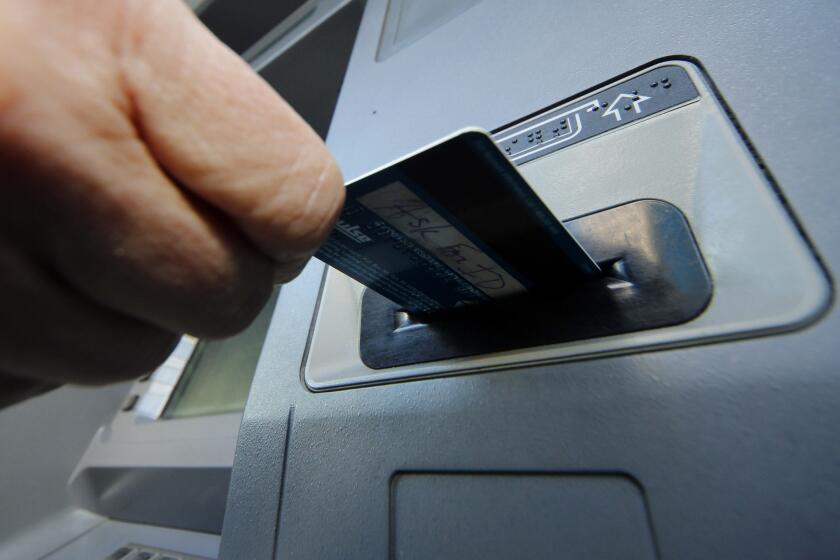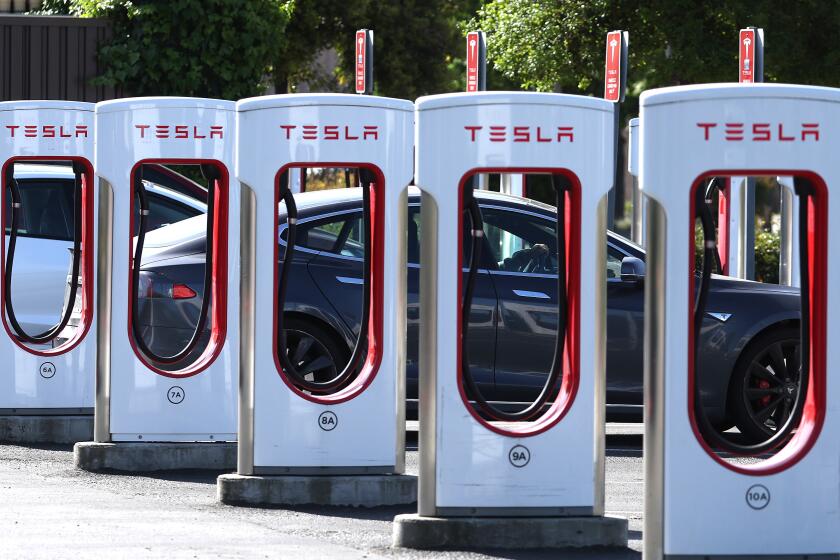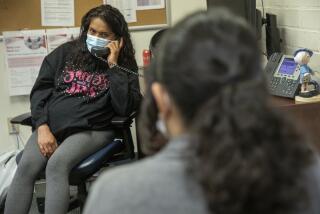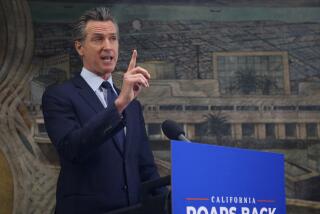Thousands of Californians haven’t touched their Middle Class Tax Refunds. Are you one of them?
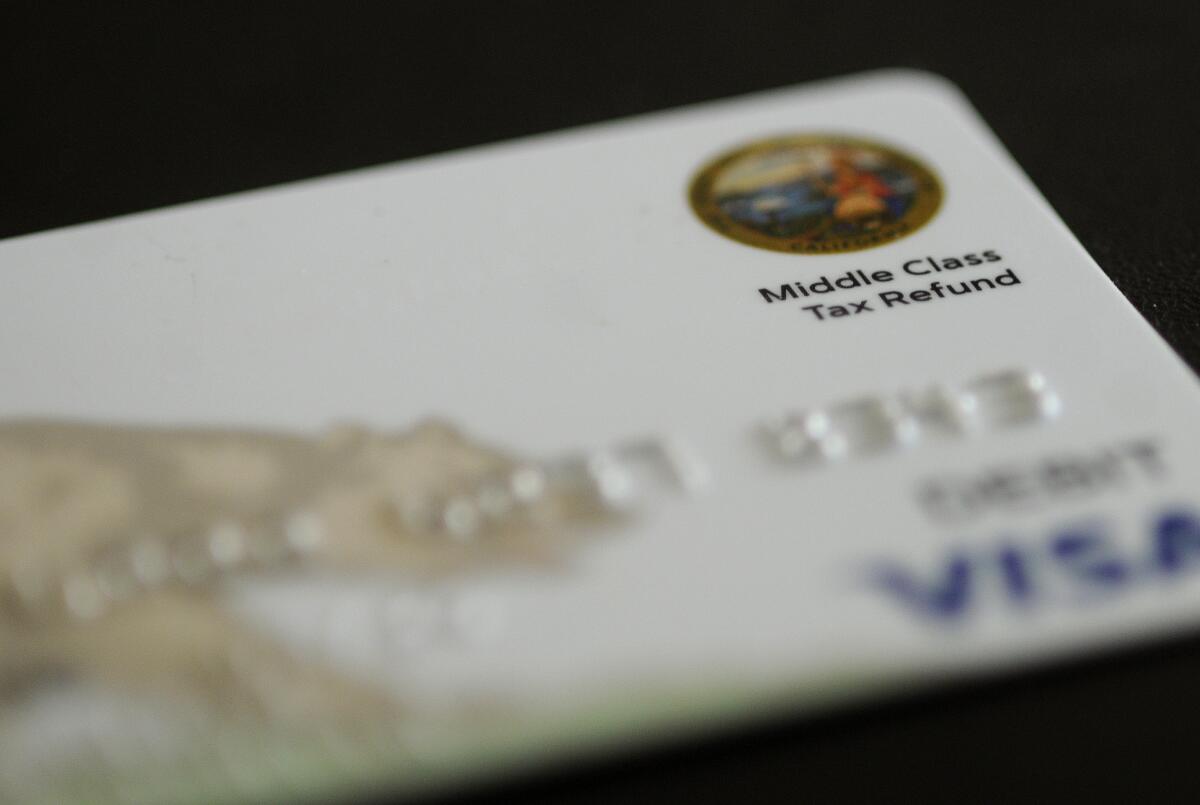
- Share via
Here’s a statistic that’s hard to understand: More than 600,000 Californians with low to moderate incomes haven’t touched the free cash the state gave them during the pandemic.
They haven’t spent it, nor have they stashed it away for a rainy day. Instead, they’ve left the money — $200 to $1,050, depending on their income level and tax-filing status — sitting on unactivated prepaid debit cards, where it doesn’t even earn interest.
The state called the handout a Middle Class Tax Refund, although truth be told, it wasn’t a refund — it was a grant from the state’s erstwhile budget surplus, ostensibly to offset the high price of gasoline and other goods. If you filed your 2020 state tax return on time, you qualified for a grant as long as your income was no more than $250,000 (for individuals) or $500,000 (for couples or heads of households).
The Franchise Tax Board made the vast majority of the grants between October 2022 and February 2023, ultimately awarding $9.2 billion to 16.8 million California taxpayers. The state sent the money straight into the bank accounts of 7.2 million households that had signed up for direct deposit, paying an average of $555, according to the tax board. The other 9.6 million households were supposed to receive their money in the form of prepaid debit cards, collecting an average of $542 per household.
Here’s the interesting thing. According to the state, more than half the cards issued still had unspent funds as of April 8. In fact, about 624,000 cards had not even been activated. That’s hundreds of millions of dollars being held by the state’s contractor, Money Network, benefiting no one in California.
A prepaid Middle Class Tax Refund card was meant to ease gas prices. But Californians are reporting that thieves are taking all or part of the money.
The FTB said an unspecified number of cards were “pending updated address information,” meaning they couldn’t find the intended recipient. A spokesman for the board couldn’t say how many cards were held up by this problem. It’s easy to imagine the state having trouble finding addresses for taxpayers experiencing homelessness, but such cases can’t account for most of the 624,000 unactivated cards.
“FTB does not have knowledge as to why some cardholders are not activating their cards but we are working to engage them with letter campaigns and social media campaigns reminding them to activate and spend,” Andrew LePage, a spokesman for the board, said in an email.
Some cards also have gone unspent because the recipients didn’t trust Money Network, whose requests for personal information strike some Californians as intrusive.
“We do not wish to give our personal details to an outside prepaid debit card company,” Jennifer Jackson Bloom of Burbank said in an email. “The State of California has all the information they need to give us a direct tax refund without employing a commercial middle-man. They should do so.”
“I’m not surprised so many people haven’t activated their cards,” Keith Ensminger of Merced said in an email. “I was almost one of them because I thought the cards were a scam, a come-on from an obscure outfit that wanted me to sign up for their credit card.”
Ensminger said he took his card to his bank, telling a clerk that he’d almost shredded it. “She said many people thought the same as me,” he said. “I’m sure the majority of people who haven’t cashed their cards never will because they shredded them or threw them away thinking the cards were a scam.”
LePage said each debit card was sent in an envelope marked “Not a bill or an advertisement,” and it included instructions on how to activate it. Recipients who have not activated their card “have also received reminder letters that include instructions on activating their debit card,” he said.
By now you may be wondering whether you are one of those taxpayers still waiting for a card in the mail. If you filed a 2020 California tax return on time, earned less than the income limits for the Middle Class Tax Refund that year and have not given your banking information to the FTB (you sent money to the FTB or received refunds from it via checks, not electronically), and you’re still a California resident, then you would appear to be eligible for a grant.
You might think that the tax board would have a list of people still missing their prepaid cards, so you could ask whether you’re on it.
You would be mistaken.
Instead, the FTB offers two potential courses of action. “If you have not received your debit card and believe that you are eligible, make sure that your address is up to date with FTB,” the board says on its website. “Visit our Help with the Middle Class Tax Refund page for instructions to update your address.”
Alternatively, you can call Money Network at (800) 240-0223. To find out whether a card was issued to you, you’ll need to navigate through a series of automated prompts, then enter the last six digits of the Social Security number used on your 2020 tax return, followed by your ZIP Code, to see if Money Network has an account that matches.
If not, you weren’t issued a Middle Class Tax Refund on a prepaid card. You can then find out whether a card was ever sent to your address and, if necessary, request a new one.
California is again looking for drivers to test a new system that would replace the gas tax with a more reliable funding source.
You may also find out, however, that your card was issued and all of the funds have been spent. There have been numerous reports of cards being hacked and accounts being drained by thieves who use physical or electronic tools to grab card numbers, PIN codes and other identifying information.
Last year an FTB audit said Money Network reported a fraud rate of 1% of the amount issued on the cards at the time, or $51.4 million.
Attorney Kevin Kneupper of the Huntington Beach-based law firm Kneupper and Covey filed a class-action lawsuit against Money Network in August on behalf of Californians whose Middle Class Tax Refund cards were hacked or not issued. But in April, U.S. District Judge Kenly Kato dismissed the complaint, ruling that individual Californians did not have standing to sue because they weren’t the intended beneficiaries of the contract between the state and the company.
Kneupper said his firm has probably heard from about 100 people who’d had problems with cards, with more complaints coming in every day.
You still have a remedy if your card is tapped by hackers, though. By law, you are entitled to be reimbursed for any unauthorized charges on your card.
The FTB and Money Network say that if you suspect your card was used without your authorization, you should call the company at (800) 240-0223 from 8 a.m. to 5 p.m. Pacific time, Monday through Friday. You’ll need to enter the number on your prepaid card, then wade through a series of automated scripts and responses to get where you’ll need to go.
To avoid hackers and thieves tapping into your prepaid card, transfer the balance into your bank account, if you have one. You can do so at no charge through mctrpayment.com, via the Money Network mobile phone app or by calling (800) 240-0223. Money Network lays out the steps on its Frequently Asked Questions page.
Alternatively, you can sign up for transaction alerts on the Money Net mobile app. That way, you can find out quickly if someone is using your card without your permission. You can use the app to lock the card to prevent any money from being withdrawn if you suspect a problem or if you know you won’t be using it for a while.
More to Read
Sign up for Essential California
The most important California stories and recommendations in your inbox every morning.
You may occasionally receive promotional content from the Los Angeles Times.
